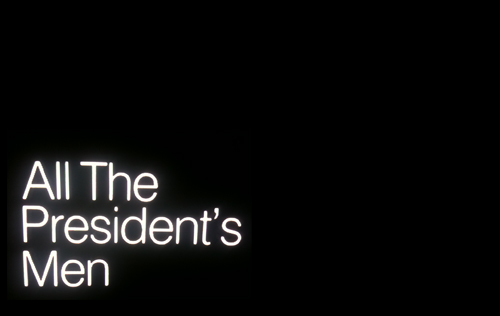
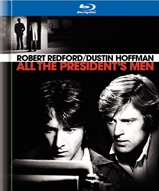 BUY FROM AMAZON: CLICK HERE!
BUY FROM AMAZON: CLICK HERE!
STUDIO: Warner Home Video
MSRP: $34.99
RATED: PG
RUNNING TIME: 128 minutes
SPECIAL FEATURES:
-Telling the Truth About Lies: The Making of All the President’s Men
-Woodward and Bernstein: Lighting the Fire
-Out of the Shadows: The Man Who Was Deep Throat
-Commentary by Robert Redford
-Vintage Featurette Pressure and the Press: The Making of All the President’s Men
-Vintage Jason Robards Interview Excerpt from Dinah!, Hosted by Dinah Shore
-Alan J. Pakula Thrillers Trailer Gallery
The Pitch
The greatest conspiracy in American history.
The Humans
Starring Robert Redford, Dustin Hoffman, Jack Warden, Martin Balsam, Hal Holbrook, Jason Robards
Screenplay by William Goldman
Directed by Alan J. Pakula
The Nutshell
After five men, one of whom has ties directly to the CIA, get caught burglarizing the Watergate Hotel – home of the Democratic National Committee – Washington Post reporters Carl Bernstein (Hoffman) and Bob Woodward (Redford) team up to investigate the story of the century for political writers, one that would potentially risk their careers and their lives as they follow the conspiracy trail all the way to the top of the United States government.
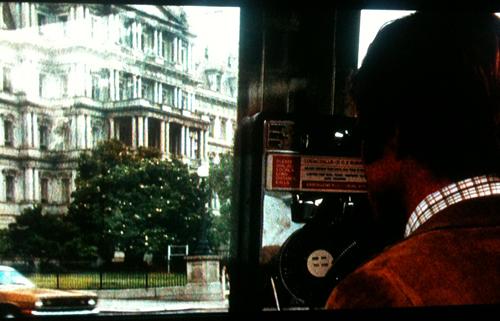
“No, no, no, not cell phone, PAY phone! Yeah, I know, the connection is incredible, isn’t it? You can actually hear me loud and clear. Love these things. Wish they weren’t so rare nowadays. If only they could text, I think these would still be all the rage.”
The Lowdown
I don’t know any way to capture that excitement that a journalist feels once he’s found a story – a real story, something with teeth, something revealing, something important – but that’s why I’m not William Goldman, because he managed to bottle up that euphoria mixed with fear topped with courage that makes All The President’s Men into the absolute classic that it is.
This was one of those rare pictures where everyone involved was firing on all cylinders. It’s a lean, mean, briskly paced mystery, but instead of the usual cops solving a murder scenario, this one elicits all the same suspense, intrigue, and surprise with two newspaper reporters as our heroes investigating a seemingly run-of-the-mill burglary. And even having seen the film a number of times and knowing how it all ends – spoiler alert: Nixon knew about it – doesn’t diminish the experience. I still found myself tense, heart thumping in my chest, near the end when Woodward is down in the parking garage at night with Deep Throat (Holbrook) and a car squeals its tires, sending Woodward off on foot, truly fearful for his life for the first time as he runs out into the night. That’s some masterful filmmaking on every level.
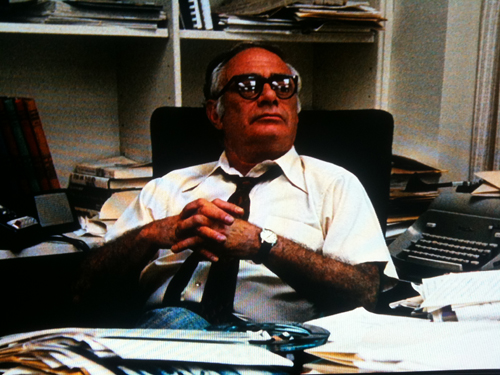
As a werewolf, Marvin wasn’t exactly ever what you would call “incognito.” In fact, he didn’t really need to “wolf out” anymore — at least not on his arms.
At its core, like others in the 1970s, it’s a film about paranoia. The Watergate scandal was the nail in the coffin because the conspiracy theory really was true. For once those who were paranoid had every reason to be. All The President’s Men oozes paranoia through every character, including our two main muckrakers, making us feel the weight of this story from a host of different angles. Naturally everyone that Woodstein interview are worried about their own safety, many of them offering them information at first only to renege on everything they’d just said after clearly having been threatened to keep their mouths shut by someone important. Another editor on the paper is paranoid about why no other papers are running their Watergate articles. Even Bernstein himself is paranoid — about having Walter Cronkite and the national news stealing the story out from under them.
Then there’s Woodward. Woodward is a rock for most of the movie, calm and cool under pressure, always the gentlemen. When they confront a fellow reporter who was engaged to a guy who worked for the Committee to Re-Elect President Nixon, and ask her to get a roster from him even though they’re no longer dating, Woodward stops pushing despite Bernstein’s persistence. Granted, this isn’t exactly altruistic of Woodward; he’s clearly playing with psychology, which is what makes him such a great reporter. In the next scene, she drops the roster on Woodward’s desk without even wanting a “thank you.” And that’s how their dichotomy works for most of the film with Hoffman and Redford playing off each other brilliantly – Bernstein comes off too pushy and Woodward as the counterbalance that keeps people talking and feeling comfortable enough to open up to them.
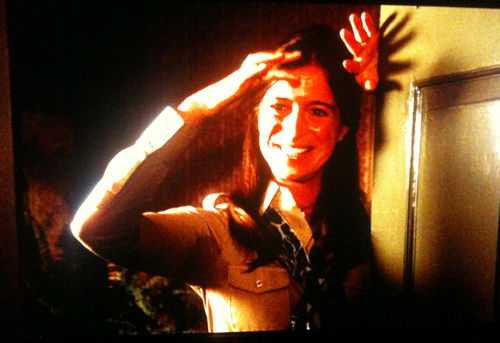
“Gee, it sure is bright! What do you have have out there, Marcellus Wallace’s soul?”
That is, until near the end, as they’re closing in on the fifth – and final – identity of those who controlled the secret slush fund of campaign money. For the first time, Woodward finally feels that paranoia while talking to Deep Throat in the parking garage. He’s worried that there truly are shadowy government agents out there looking to silent him once and for all; and he has every reason to believe it, too. At this point, Woodward stops being the good cop to Bernstein’s bad cop, which leads to both their biggest discovery and their biggest, and first, mistake. It’s Bernstein’s charming persistence and pushy nature that extracts the information leading to the naming of White House Chief of Staff Bob Haldeman as the head of the whole illegal funds, the dagger that extended the conspiracy all the way to the presidency. Had Woodward been there with him to use his slow-burn method, it may not have happened. But while it was a monster of a story, it also ended up backfiring for them, embarrassing the entire paper, and nearly derailing the entire case. Of course, we know that it didn’t, and their reporting exposed a conspiracy that involved numerous government agencies, okayed by President Nixon himself.
But what a novel concept for Goldman to end the film on Woodstein’s major mistake rather than on their solid victory of getting it right. Not only does it work extremely well narratively – the suspense keeps us hanging on every single word in every single scene – but also is right for the theme of the film, which Washington Post editor Ben Bradlee (brilliantly portrayed by Jason Robards) spells out for us: when he was a young reporter himself, he reported the facts correctly but still managed to get it wrong. The notion that we can be right and wrong at the same time flows through this film, with the opposing methods that Woodstein use to investigate their story and how they tend to work in concert but sometimes butt heads, and the specific characters themselves like Committee Treasurer Hugh Sloan who quit his job because he knew illegal things were going on and didn’t want to be a part of it. While Nixon and the five men who ran the slush fund were clearly wrong, the rest of the cast of characters that we actually spend time with occupy that gray area that most of us inhabit, that murky space where we can sometimes be both right and wrong at the same time.
Redford is owed much of the credit for this film even existing. He bought the book rights and used his star power to make sure that this likely difficult picture to sell to the studios would get made. He was so integral that, in the opening titles, he shares the “a film by” credit with director Alan J. Pakula, a extreme rarity on its own, even more so considering Redford didn’t even have a producing or writing credit. It was also Redford’s idea to have both him and Hoffman memorize each other’s lines so that they could step over each other during scenes, acting as if they were sharing the same mind. It was a brilliant idea and works magically on screen.
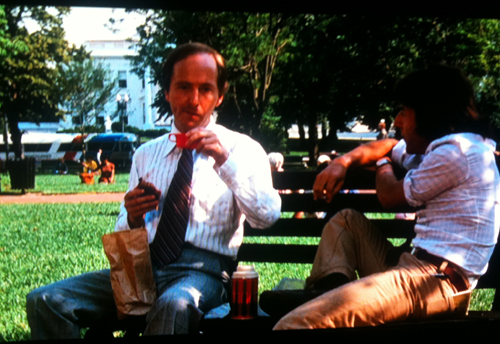
If that guy’s tie were a bit skinnier, he could pass as a modern hipster no problem.
There aren’t many important films compared to the amount of movies that come out in any given year. But this is one of them, one that stands the test of time, and even finds itself perhaps more important now than when it came out in 1976. As a reminder of the role that the media should be taking with regard to the political establishment, there’s no better film than this. And while it’s common to cry about how biased and ineffective the mainstream media is nowadays, it’s necessary to remember that uncovering this Watergate scandal was no easy task nor was it something that all the news outlets and reporters were jumping on back then; Woodstein’s first articles were buried within the daily paper. It’s always a struggle to be the counterbalance to something as institutionally powerful as the government, even a freely elected one such as our own. And this is one instance of many where those reporters – and editors – bravely stuck to their convictions, their professionalism, and their integrity to break their story.
Plain and simple, an extraordinary, timeless film.
The Package
A gorgeous transfer that looks fantastic in high-definition despite having no special effects to speak of. I can’t imagine ever tiring of that classic ’70s film look, especially when its as crisp and clear as it is here on Blu-ray. Gordon Willis’ long lenses create compact frames of exceeding tension even when it’s just two guys hammering away on their typewriters. The case itself is nice, with a short booklet built in that is well worth the quick read and photos of the actors and their real-life counterparts.
Rating: 




Out of a Possible 5 Stars
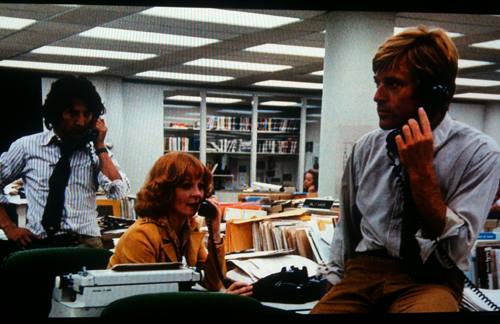
I knew the ’70s were way lax when it came to their sexual mores, so I figured their threesomes would be hotter than this.